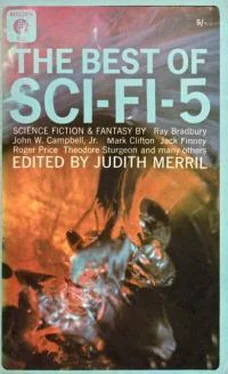The Best of Sci-Fi-5
Здесь есть возможность читать онлайн «The Best of Sci-Fi-5» весь текст электронной книги совершенно бесплатно (целиком полную версию без сокращений). В некоторых случаях можно слушать аудио, скачать через торрент в формате fb2 и присутствует краткое содержание. Год выпуска: 1966, Издательство: Mayflower-Dell, Жанр: Фантастика и фэнтези, на английском языке. Описание произведения, (предисловие) а так же отзывы посетителей доступны на портале библиотеки ЛибКат.
- Название:The Best of Sci-Fi-5
- Автор:
- Издательство:Mayflower-Dell
- Жанр:
- Год:1966
- ISBN:нет данных
- Рейтинг книги:3 / 5. Голосов: 1
-
Избранное:Добавить в избранное
- Отзывы:
-
Ваша оценка:
- 60
- 1
- 2
- 3
- 4
- 5
The Best of Sci-Fi-5: краткое содержание, описание и аннотация
Предлагаем к чтению аннотацию, описание, краткое содержание или предисловие (зависит от того, что написал сам автор книги «The Best of Sci-Fi-5»). Если вы не нашли необходимую информацию о книге — напишите в комментариях, мы постараемся отыскать её.
The Best of Sci-Fi-5 — читать онлайн бесплатно полную книгу (весь текст) целиком
Ниже представлен текст книги, разбитый по страницам. Система сохранения места последней прочитанной страницы, позволяет с удобством читать онлайн бесплатно книгу «The Best of Sci-Fi-5», без необходимости каждый раз заново искать на чём Вы остановились. Поставьте закладку, и сможете в любой момент перейти на страницу, на которой закончили чтение.
Интервал:
Закладка:
The program director, Alto and one of the comperes stood in front of her, banging on the rail and trying to attract her attention. But Madame Gioconda failed to notice them. Head back, eyes on the brilliant ceiling lights, hands gesturing majestically, she soared along the private causeways of sound that poured unrelentingly from her throat, a great white angel of discord on her homeward flight.
Mangon watched her sadly, then slipped away through the stage hands pressing around him. As he left the theater by the stage door a small crowd was gathering by the main entrance. He flicked away the blood from his fingers, then bound his handkerchief round them.
He walked down the side street to where the sound truck was parked, climbed into the cab and sat still for a few minutes, looking out at the bright evening lights in the bars and shop-fronts.
Opening the dashboard locker, he hunted through it and pulled out an old wrist-pad, clipped it into his sleeve.
In his ears the sound of Madame Gioconda singing echoed like an insane banshee.
He switched on the sonovac under the dashboard, turned it full on, then started the engine and drove off into the night.
PLENITUDE
by Will Worthington
from Fantasy and Science Fiction
There seems to be some doubt as to whether this was the first, second, or third story of three bought and published by three different magazines almost simultaneously. It marks, in any case, one-third of the debut of yet another striking new talent in the s-f field. Unlike Mr. Keyes, who has a long background in publishing, or Mr. Langart, who has written—I understand—in other fields, Mr. Worthington has turned to writing after years of experience in government work. There is a freshness of language and vigor of thought in all the stories of his I have seen which are rarely equaled by the more experienced writers in the field.
“Why can’t we go home now, Daddy?” asked Mike, the youngest, and the small tanned face I saw there in the skimpy shade of the olive tree was mostly a matter of eyes —all else, hair, cheeks, thumb-sized mouth, jelly-bean body and usually flailing arms and legs, were mere accessories to the round, blue, endlessly wondering eyes. ( “The Wells of ‘Why’” … It would make a poem, I thought, if a poem were needed, and if I wasn’t so damned tired. And I also thought, “Oh, God! It begins. Five years old. No, not quite. Four.”)
“Because Daddy has to finish weeding this row of beans,” I said. “We’ll go back to the house in a little while.”
I would go back to the house and then I would follow the path around the rocks to the hot springs, and there I would peel off what was left of my clothes and I would soak myself in the clear but pungent water that came bubbling—perfect—from a cleft in the rocks to form a pool in the hollow of a pothole—also perfect. And while I steeped in the mineral water I could think about the fish which was soon to be broiling on the fire, and I could think of Sue turning it, poking at it and sprinkling herbs over it as though it was the first or perhaps the last fish that would ever be broiled and eaten by human creatures. She would perform that office with the same total and unreserved dedication with which, since sun-up, she had scraped deerskin, picked worms from new cabbage-leaves, gathered firewood, caulked the walls of the cabin where the old chinking had fallen away or been chewed or knocked away by other hungry or merely curious creatures, and otherwise filled in the numberless gaps in the world—trivial things mostly which would not be noticed and could not become great things in a man’s eyes unless she were to go away or cease to be. I don’t think of this because, for all immediate purposes—there are no others—she is the first Woman in the world and quite possibly—the last.
“Why don’t we live in the Old House in the valley, Daddy?”
It is All-Eyes again. Make no mistake about it; there is a kind of connectedness between the seemingly random questions of very small kids. These are the problems posed by an Ur -logic which is much closer to the pulse of reality than are any of the pretentious, involuted systems and the mincing nihilations and category-juggling of adults. It is we who are confused and half-blinded with the varieties of special knowledge. But how explain? What good is my experience to him?
“There are too many old things in the Old House which don’t work,” I say, even as I know that I merely open the floodgates of further questions.
“Don’t the funny men work, Daddy? I want to see the funny men! Daddy, I want …”
The boy means the robots. I took him down to see the Old House in the valley once before. He rode on top of my haversack and hung on to my hair with his small fingers. It was all a lark for him. I had gone to fetch some books— gambling that there might be a bagful of worthwhile ones that had not been completely eaten by bugs and mice; and if the jaunt turned out depressing for me, it was my fault, which is to say the fault of memory and the habit of comparing what has been with what is—natural, inevitable, unavoidable, but oh, God, just the same … The robots which still stood on their size-thirty metal feet looked like grinning Mexican mummies. They gave me a bad turn even though I knew what they were, and should have known what changes to expect after a long, long absence from that house, but to the kid they were a delight. Never mind transphenomenality of rusted surfaces and uselessly dangling wires; never mind the history of a senile generation. They were the funny men. I wish I could leave it at that, but of course I can’t. I hide my hoe in the twigs of the olive tree and pick up Mike. This stops the questions for a while.
“Let’s go home to Mummy,” I say; and also, hoping to hold back the questions about the Old House long enough to think of some real answers, “Now aren’t you glad we live up here where we can see the ocean and eagles and hot springs?”
“Yeth,” says Mike firmly by way of making a querulous and ineffectual old man feel better about his decision. What a comfort to me the little one is!
I see smoke coming from the chimney, and when we round the last turn in the path we see the cabin. Sue waves from the door. She has worked like a squaw since dawn, and she smiles and waves. I can remember when women would exhaust themselves talking over the phone and eating bonbons all day and then fear to smile when their beat husbands came home from their respective nothing-foundries lest they crack the layers of phony “youthful glow” on their faces. Not like Sue. Here is Sue with smudges of charcoal on her face and fish-scales on her leather pants. Her scent is of woodsmoke and of sweat. There is no artificial scent like this—none more endearing nor more completely “correct.” There was a time when the odor of perspiration would have been more of a social disaster for a woman than the gummata of tertiary pox. Even men were touched by this strange phobia.
Sue sees the question on my face and she knows why my smile is a little perfunctory and strained.
“Chris … ?” I start to ask finally.
“No. He took his bow and his sleeping-bag. Muttered something about an eight-point buck.”
We do not need the venison. If anything has been made exhaustively and exaustingly clear to the boy it is that our blessings consist in large part of what we do not need. But this is not the point, and I know it is not the point.
“Do you think he’ll ever talk to me again, Sue?”
“Of course he will.” She pulls off my sweaty shirt and hands me a towel. “You know how twelve is. Everything in technicolor and with the throbbiest possible background music. Everything drags or jumps or swings or everything is Endsville or something else which it actually isn’t. If it can’t be turned into a drama it doesn’t exist. He’ll get over it.”
Читать дальшеИнтервал:
Закладка:
Похожие книги на «The Best of Sci-Fi-5»
Представляем Вашему вниманию похожие книги на «The Best of Sci-Fi-5» списком для выбора. Мы отобрали схожую по названию и смыслу литературу в надежде предоставить читателям больше вариантов отыскать новые, интересные, ещё непрочитанные произведения.
Обсуждение, отзывы о книге «The Best of Sci-Fi-5» и просто собственные мнения читателей. Оставьте ваши комментарии, напишите, что Вы думаете о произведении, его смысле или главных героях. Укажите что конкретно понравилось, а что нет, и почему Вы так считаете.












